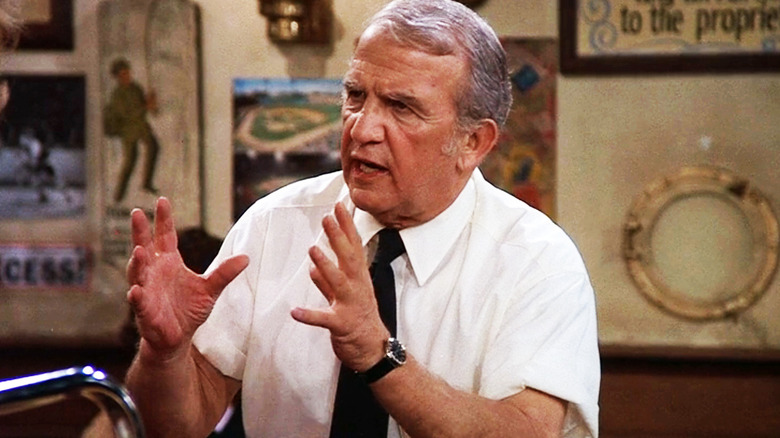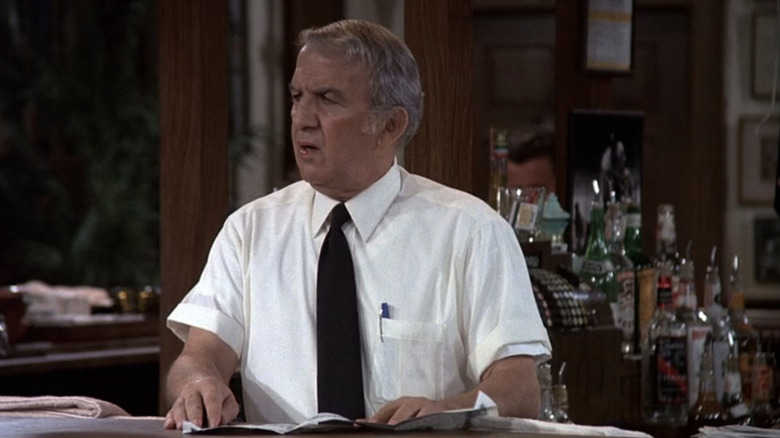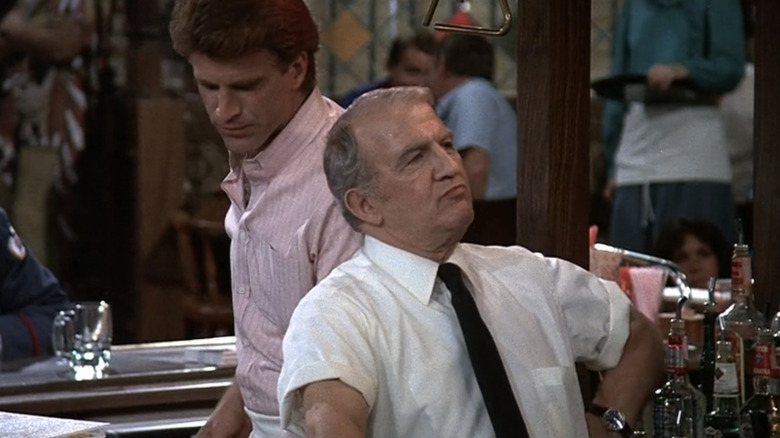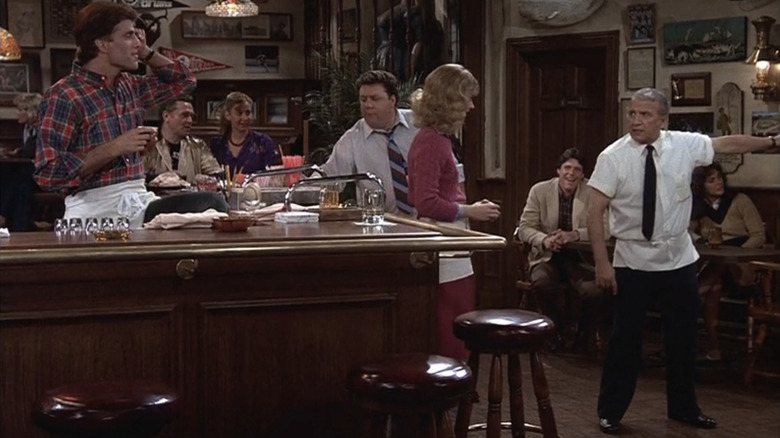Why Cheers' Coach Goes Missing In Season 3 And Never Returns
When "Cheers" wrapped up in 1993, it looked a lot different from the show that began airing in 1982. The finale not only brought in almost 100 million viewers, it became one of the most-watched installments of any TV show ever made — even courting the attention of then-President Bill Clinton, who was eyeing up a cameo in the finale before forcing the writers to scrap those plans at the last minute.
But back when "Cheers" debuted, it almost crashed and burned with its very first season. In fact, it would take until the end of the third season for the show to really find its footing, ratings-wise. Sadly, one of the central characters who'd help solidify the series' huge success would no longer be around to enjoy the glory years to come.
Coach Ernie Pantusso (Nicholas Colasanto), affectionately known by the Cheers bar crew as "Coach," was a central part of the show since the off. Debuting in the pilot episode, the congenial old Pantusso was Sam Malone's (Ted Danson) former baseball coach and was brought in to bartend when Sam acquired the titular bar. Entertainment Weekly called him "the most lovable TV father figure since Mary Tyler Moore's Lou Grant," and while Coach certainly provided some real heart to a show where most characters were often overcome by self-interest, Colasanto's character also performed a practical purpose. As writer Ken Levine once told The Hollywood Reporter, "Having such a 'dumb' character (from too many head concussions in baseball) allows you to get exposition out. When you explained things to Coach, you were really explaining it to the audience."
So why would a character who formed a big part of the heart of the show and gave its writers an easy way to write exposition suddenly vanish from "Cheers?"
Coach was an irreplaceable member of the ensemble
As Ken Levine mentioned, Coach Pantusso had indeed taken several hits to the head during his illustrious baseball career — something which the character liked to point out on a frequent basis, if only to account for his often lackluster manner. The kindly old gent was typically one step behind his colleagues and the Cheers bar patrons, as evidenced by the opening of season 1, episode 4, in which Harry "The Hat" Gittes (Harry Anderson) easily cons Coach into giving him far more change than he's owed. But Coach's cognitive failings only served to add to his lovable aura. Not only that, Pantusso was capable of real wisdom, often providing other characters with sound advice without even realizing how he stumbled upon it. All of which is to say that Coach was an irreplaceable part of the "Cheers" ensemble. But when season 4 kicked off in 1985, suddenly the bar's father figure was gone and he had, in fact, been replaced.
In a 2015 interview with Yahoo!, long-time "Cheers" director and executive producer James Burrows explained how he and the show's other producers were aware that Nick Colasanto had a heart problem, but claimed that none of the team knew "how dire it was." He added, "Nick had trouble remembering lines. I'm sure it had a lot to do with the blood getting to the head. But we always compensated for it, because he was such an integral part of the show."
According to Burrows, who last year returned to direct a couple of episodes of the recently renewed "Frasier" revival show, Colasanto started writing down his lines on the scenery, and the producers would often make the lines simpler to help him get them out. Sadly, things would get worse from there.
Coach's last appearance was in season 3
Despite the various accommodations "Cheers" made for Nick Colasanto, the actor would continue to deteriorate before being hospitalized part-way through season 3 due to water in his lungs. After that, on doctors' advice, Coach would never return to the bar. Colasanto's last full episode was "Cheerio, Cheers," which had been shot in November 1984. Fans would also get a glimpse of their beloved Coach during the cold open of the season 3 finale — a scene that had also been shot prior to Colasanto's departure.
Sadly, Colasanto himself wouldn't even be around to see the episode air. The actor passed away at the age of 61 on February 12, 1985, before the "Cheers" season 3 finale aired on May 9, 1985.
Following Colasanto's passing, "Cheers" co-creator Les Charles told the Los Angeles Times, "After we found out, we got the entire cast together and made the announcement. Everyone was heartbroken." According to James Burrows, Colasanto's passing was also difficult from a writing perspective, in the sense that, as the director put it to Yahoo!, "[Colasanto's] voice was very important to the rest of the cast and to the show. So we had to deal with the fact that he wasn't around." The writers did so by having Coach leave on vacation, with other characters reading out letters he'd sent back to the bar. But they still had to figure out how to move on in season 4.
Woody became the new Coach
Nick Colasanto had been an integral part of "Cheers" since its pilot, so moving on without him must have been a vertiginous thought for everyone involved in the show. At least the producers had a whole summer following the season 3 finale to figure things out. As James Burrows told Yahoo!, "You didn't want to replace Coach. You didn't want to do the same character." However, according to Ken Levine, NBC was keen for a new character to be introduced that was "similar because of the role Coach played."
That character would ultimately arrive in the form of Woody, played by a young Woody Harrelson, who won his role on "Cheers" by breaking down in tears. Specifically, Harrelson wowed the writers during his audition by crying after being told of Coach's passing. This new addition to the cast was actually connected to Coach in that he was a pen pal of the late bartender who stepped into the role left vacant by his former friend during the fourth season. Thankfully, Woody managed to provide much of the affable energy that Coach had brought to the ensemble, and the show would go on to maintain its standing as one of the most beloved sitcoms of all time. It also continued to evolve throughout its run, introducing yet more characters, such as Kirstie Alley's Rebecca Howe, who like Woody, helped buoy "Cheers" when it needed it most.
Still, there's no doubt those initial seasons remain special in large part due to Nick Colasanto's presence. Though his departure may have been abrupt and tragic, the former bookkeeper from Rhode Island will at least remain immortalized in one of the all-time great TV shows.



